|
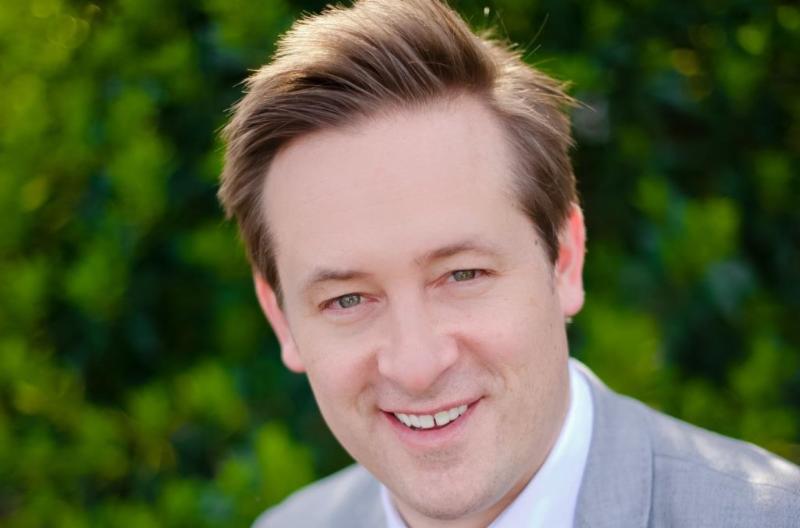 Quite a frenetic period since our last newsletter! We're still working out the details of a couple of new opportunities that we'll be sharing more about in the coming weeks.
For now, we're excited and grateful for the many positive people and developments that have filled our schedules thus far in 2017, capped off in March by a visit to the US by the International Council of Initiatives of Change (IC). Drawn from Colombia, Ukraine, Lebanon, Australia, Sri Lanka, Kenya, India and Norway, as well as the USA, our IC visitors brought important global perspectives to our country and our organization. In this issue you will learn a bit more about the visiting group and the productive meetings they had while here. There is also a thoughtful reflection by Mohan Bagwandas, Vice President of IofC International. Quite a frenetic period since our last newsletter! We're still working out the details of a couple of new opportunities that we'll be sharing more about in the coming weeks.
For now, we're excited and grateful for the many positive people and developments that have filled our schedules thus far in 2017, capped off in March by a visit to the US by the International Council of Initiatives of Change (IC). Drawn from Colombia, Ukraine, Lebanon, Australia, Sri Lanka, Kenya, India and Norway, as well as the USA, our IC visitors brought important global perspectives to our country and our organization. In this issue you will learn a bit more about the visiting group and the productive meetings they had while here. There is also a thoughtful reflection by Mohan Bagwandas, Vice President of IofC International.
This issue describes our ongoing Community Trustbuilding Fellowship - now at the halfway point in our annual program to account for our history, to honestly talk about race and to build relationships, empathy and trust. A number of this year's Fellows share their experiences in this issue. Coverage is also given to our comparable trustbuilding work that continues to engender a conversation and understanding in Troup County, GA - with national media coverage of that community's work appearing in January.
In the meantime, our work to build a coalition of partners to help build an equitable community here in Central Virginia picked up steam during February with a "Journey to Equity" forum we were honored to co-sponsor with the University of Richmond. At the event, Rev. Alvin Herring from the W. K. Kellogg Foundation and the Truth, Racial Healing and Transformation enterprise, challenged and galvanized the Richmond community, while helping set the stage for next steps we must take as a community. We were boosted by his presence and the momentum we're building as we move deeper into the year.
And one more quick thought: please note the information about the Caux Forum this summer and consider taking part!
Sincerely,
Jake Hershman
Executive Director
|
|
Closing the racial equity gap benefits all
Rob Corcoran
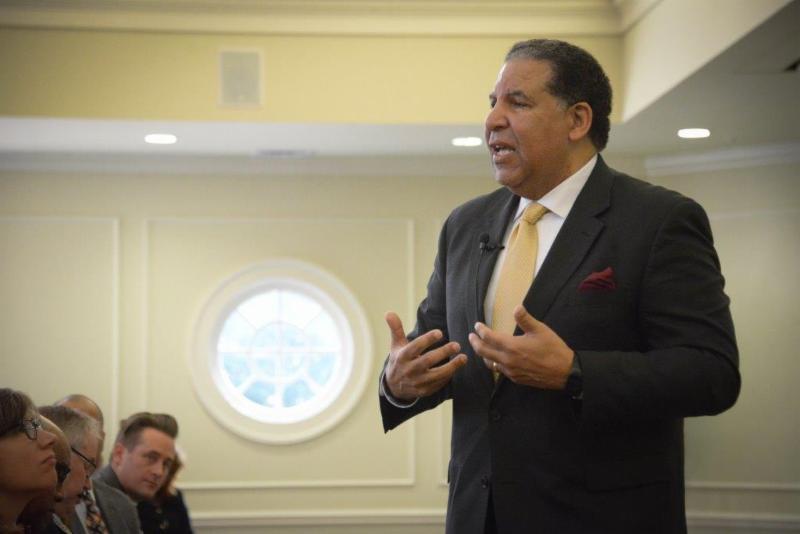 "We in this country are at a cultural and maybe moral crossroads," says Rev. Alvin Herring, director of racial equity and community engagement at the W.K. Kellogg Foundation. "We must speak truth, hold ourselves accountable, lament, and offer and accept forgiveness." Herring was speaking to 300 community leaders at a forum titled "Journey to Equity" organized by Hope in the Cities and hosted by the University of Richmond. In welcoming the participants, Dr. Ronald Crutcher, president of the University of Richmond, recognized the challenge. "This is not easy work and we all have a part to play."
Rev. Herring told the audience that the Kellogg Foundation is "launching a Truth, Racial Healing and Transformation enterprise and Richmond is one of 10 localities chosen to launch it." While in Richmond, he met with police and faith leaders and with the city's Office of Community Wealth Building (OCWB) which was created to implement the recommendations of the anti-poverty commission. (Photo: Rev. Alvin Herring)
Speaking on behalf of Mayor Levar Stoney, who constructed an unprecedented multiracial coalition to win office, Dr. Thad Williamson, OCWB's first director, told the forum, "The research question I care most about is finding out just how far we can go in making the city of Richmond a model of emerging social justice out of the embers of an often-terrible history." He thanked Hope in the Cities for its work over the decades to "overcome racial polarization and to help make possible this strange moment, when Richmond is being seen as a harbinger of hope in what for many is a terrible and fearful time...Mayor Stoney in the campaign liked to say his goal was that by the end of his tenure Richmond would no longer be referred to as the former capital of the Confederacy. Perhaps we will become known as the capital of racial reconciliation. Or better yet, imagine Richmond being known as the capital of community wealth building with a racial equity lens and unabashed commitment to inclusion of and respect for all people."
Read more
|
|
International Council visits the US
|
|
New perspectives, models and experiences
Susan Corcoran
"We need a democracy coalition worldwide," said US Senator Tim Kaine in a meeting at his Richmond, VA, office with the
International Council of Initiatives of Change who recently spent two weeks in this country. Kaine added, "Democracies are being hurt from the inside as well as from the outside." The members of the IC emphasized the impact the current political climate in the US has on their countries. Olena Kashkarova from Ukraine said, "With your elections, I don't know if my country will continue to exist." Wadiaa Khoury from Lebanon shared with Senator Kaine how her colleagues in Lebanon are engaged in courageous dialogue across political, ethnic and religious divides. She said, "We always try to connect the people of good will in the country."
|
|
|
International Council meet with US Senator Tim Kaine
|
The International Council (IC) provides leadership to Initiatives of Change and exists to inject a measure of innovation and cohesion to the global network of partners. The current members are drawn from Colombia, Ukraine, Lebanon, Australia, Sri Lanka, Kenya, India, Norway, and the USA. Their visit to the US began in Washington, DC, followed by a week in Richmond, VA, seeking new perspectives, models and experiences to help inform their work. (See bios in the right column)
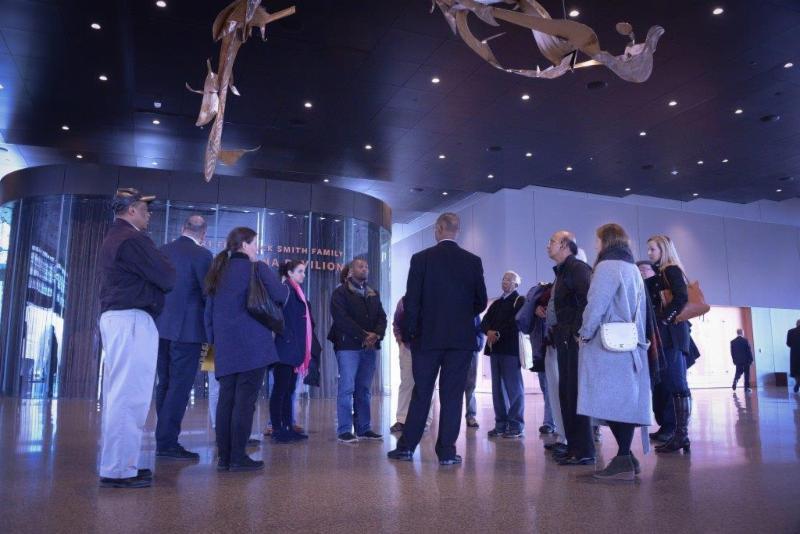 On arrival in Washington they were given a VIP tour of the new National Museum of African American History and Culture by John W. Franklin, Director of Partnerships and International Programs. This exposure to a new telling of history made an enormous impact on the group and helped informed them of the complexities of America, a country that the world often thinks it knows. In light of the current Islamophobia and fears of terrorism Franklin said, "We like to celebrate history but not all history can be celebrated. This country invented terrorism, homegrown terrorism. On 9-11 people say terrorism and I say my people have been experiencing that from the time they came." In conversation afterwards Stephen Kimaru from Kenya expressed what an emotional and powerful experience the museum was for him.
The group met with Imam Magid and others at the All Dulles Area Muslim Society (ADAMS), one of the largest Muslim congregations the United States. Imam Magid is the Chairman of International Interfaith Peace Corps (IIPC). He shared with the group: "When you show love to people, you become a better person. The elevation happens to you... Until we build relationships we do not know how best to treat the other. It means going beyond treating others as we would like to be treated to the point where we treat others as they would like to be treated."
Read more
|
|
Community Trustbuilding Fellowship
|
|
Being in the fire
Rob Corcoran
"This experience has been truly one of a kind," says Franklin Jennings who works with youth development. "What I find most impactful is that although tons of people in the world want to see good change happen, not many are equipping themselves to do anything about it." Franklin is one of 26 community leaders from Richmond, VA, and six other states who have just completed the third of five residential weekend modules in the
Community Trustbuilding Fellowship. He says, "This program is helping me to be able to not only ask the tough questions, but to ask those questions to the right people while establishing real respect that will help us to come up with an answer together."
"What makes this fellowship distinctive to me is the opportunity and expectation for application," says Kelly Merrill, a professor of human communication studies, with interests in leadership, social justice, and dialogue. "The quality of the instruction is challenging and enriching, with expert facilitation and instruction." She highlights guest faculty member, Dr. Hugh O'Doherty, who teaches leadership at Harvard's Kennedy School of Government. He has worked with groups in Bosnia, Croatia and Cyprus, as well as with Israelis and Palestinians, Armenians and Turks, and Kashmiris. In a weekend devoted to the skills of dialogue facilitation, O'Doherty stressed that facilitation is not a technique but a life discipline. Merrill recalls his insight that "you are what you meditate." The goal as a facilitator is to hold fast to your purpose (a word derived from the Greek word for fire). The key is "how to develop a tolerance for being in the fire. The limit of the dialogue will be the limit of what you can tolerate." You need to observe and interpret what is going on in the room and be "a mirror to reflect back to the group what it can't see."
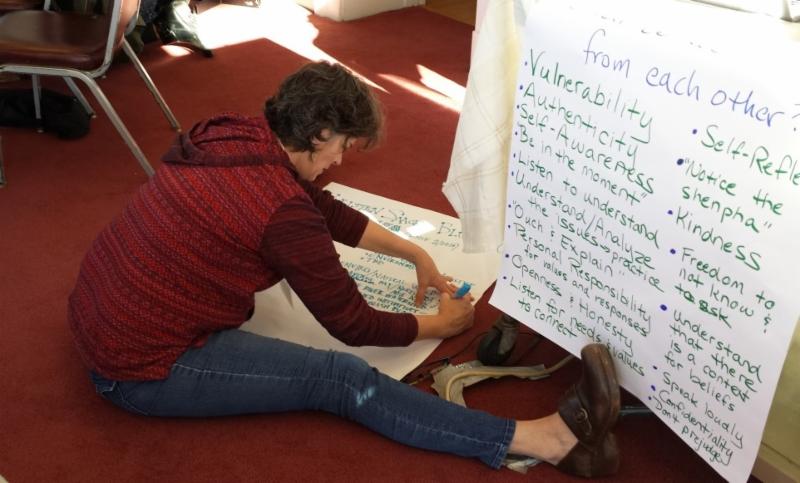 Other program modules explore the connection between personal and social change and the power of history and its legacy. Guest faculty Hannibal Johnson, an author and historian from Tulsa, OK, described the 1921 "race riot" when over 1,200 homes as well as business, schools and churches in the black community were destroyed by white mobs in what been called the worst act of domestic terrorism in US history. Johnson is part of an interracial coalition working to uncover the story which had been largely "buried" until 1971. The Tulsa riot was part of a national pattern of assault on black communities when lynching was a regular occurrence. "White people brought their little dressed-up children as if to a carnival to watch people being hanged, burned and castrated." But he added that today white people are often angry that they don't know their own history; they feel they have been cheated, short-changed. "Whites may not know it but we are all victims [of racism] today and the sooner we act on making amends, the better off we will be."
The module on history provoked deep emotions, vigorous debate and some conflict, including within racial groups. One participant remarked, "White liberals in America are not having conversations with those who feel differently." Melody Porter reflects: "Debriefing our walk on the Trail of Enslaved People I was face to face with my privilege and responsibility, the stories I know about my family, and what it means for me as a white person to work for racial healing and justice today." Porter, who directs the Office of Community Engagement at the College of William and Mary, continues: "At one point during the weekend, a side comment came up that made me think hard about one question in particular: Am I proud to be a white woman? My response at that time is still true a couple of weeks later: 'Well, that's a longer conversation.' It is. And as I prepare for our next modules together, and my daily work of justice in these areas, it is a conversation I will continue to have in my own heart and with others whom I trust to hold it, with challenge and grace."
Read more
|
Truth-telling and an apology for a lynching
By Susan Corcoran
|
|
|
Photo: Dustin Chambers for The New York Times
|
The New York Times
and other media outlets last month carried the story of an historic apology made in Troup County, GA. On January 26, 2017, LaGrange's police chief, Louis M. Dekmar, who is white, issued a rare apology for a Southern lynching. Seventy-seven years earlier Austin Callaway, a young African American, was snatched from a jail cell by a band of masked white men, then shot and left for dead. Many in the community had never heard of this atrocity but on Thursday evening, wrote the New York Times, "the fatal cruelties inflicted upon Mr. Callaway - long obscured by time, fear, professional malfeasance and a reluctance to investigate the sins of the past - were acknowledged in this city of 31,000 people."
Chief Dekmar addressed a crowd at a traditionally African American church, "I sincerely regret and denounce the role our Police Department played in Austin's lynching, both through our action and our inaction. And for that, I'm profoundly sorry. It should never have happened."
Over the past two years city and county residents, including Chief Dekmar, have been engaged in a program of racial reconciliation and trustbuilding facilitated by Hope in the Cities. Ricky Wolfe, a white former county commission chairman, is an organizer of the program. His partner is former state Rep. Carl Von Epps, who is black. When speaking to county commissioners Wolf said, "People have said, 'This is a big problem, Ricky, but you shouldn't be talking about it because it's going to make it worse.'"
The aim of the program is simple: to bridge racial divides in Troup County through trustbuilding, research, community collaboration and action in order to remove barriers that prevent full access to opportunities for all.
These two community leaders have been unwavering in their commitment. The three city governments of LaGrange, Hogansville and West Point that make up Troup County collectively pledged funds and LaGrange College, which Wolfe said would act as the "hub" of the program, also pledged funds and the use of its facilities.
The LaGrange Daily News quoted Von Epps: "Truth be told, we have a problem. Not only is it a racial divide, it's an economic divide and a cultural divide. Truth be told, there's a spiritual division here... Our hope is to bring people together - it's a trustbuilding effort."
Hope in the Cities facilitators Tee Turner and Cricket White have made numerous visits to Georgia to provide training and facilitation.
Read more
|
|
A new American dream
Mohan Bhagwandas, Vice President of IofC International, was recently in the US for two weeks with members of the International Council. He writes his reflections on their visit:
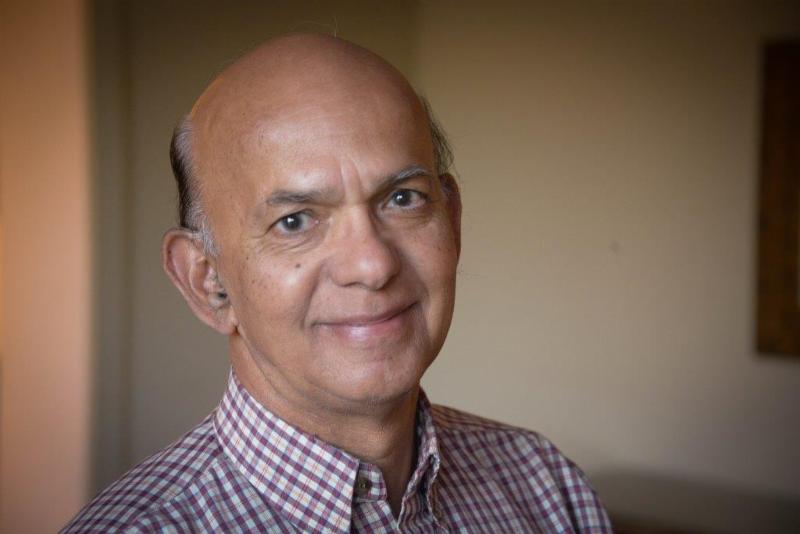 Ten of us from eight countries and five continents had braced ourselves for challenges at the US customs and border control as we entered the country. On the contrary none of us had issues and we were pleasantly surprised. Border control officers even welcomed us warmly and it was one of the fastest entries into a country I have ever had!
There is a vibrant energy in America that impacts you. In America, it is OK to stand out, it is OK to raise your head above the crowd, it is OK to succeed and shine. There seems to be an enthusiasm, passion and belief that things can and will always get better. The world needs this "spirit of America."
The day after we arrived in Washington, DC, we were given a special tour of the newly established National Museum of African American art and Culture. Through a brilliant combination of multi-media, photography and script, you walk through the eras of slavery, civil war and civil rights, that have shaped modern America.
You cannot walk through the museum and come out the same person. The greatness of a nation is often signaled by its capacity to find redemption by telling its own story as it really happened. The museum does this.
Invariably, most conversations turn towards the new president, Donald Trump. Many theories are given as to how someone completely from the outside of mainstream politics, secured the top job in the United States. I have a theory. It is to do with capitalism itself, the system that gave birth to the American Dream.
My mind went back to the African American museum where I saw capitalism manifest in its most brutal form. Wealth was generated in that phase of economic development on the backs of enslaved Africans. It was cheap labor, low cost of production, servicing a massive export market for sugar and cotton. America became rich under this obscene form of capitalism. It was the injustice of this that fueled the civil war, which eventually ended slavery. I write this in Richmond, Virginia, which was one of the hubs of the slave trade in the US. The International Council had the profound experience of walking the "Slave Trail" used by the shackled and chained human cargo, who were bought and sold at downtown markets along the James River.
Initiatives of Change has played a leading role over the past 30 years in acknowledging this history and creating space for honest conversation. We learned how its Hope in the Cities program has been at the forefront of this initiative.
There has been an unprecedented growth of capitalism in America and the world over 70 years since the end of WWII. What we are seeing now is the plateauing of an economic system that has delivered wealth and wellbeing to many but which has also resulted in a growing gap between rich and poor.
Read more
|
|
We hope you enjoyed this issue of
Trustbuilders.
Please share this newsletter with your friends and forward it to those you know have a passion for trustbuilding.
|
|
|
Please consider
a gift to Initiatives of Change!
Sixty percent of our support comes from people just like you! No gift is too large or too small.
Become a sustaining donor with a monthly gift!
|
Journey to Equity
Closing the racial equity gap benefits all
A Trustbuilding Forum co-hoted by Hope in the Cities and the University of Richmond, February 8, 2017
Listen to a podcast of keynote speaker Rev. Alvin Herring, director of racial equity and community engagement for the W. K. Kellogg Foundation.
|
|
IofC International Council
|
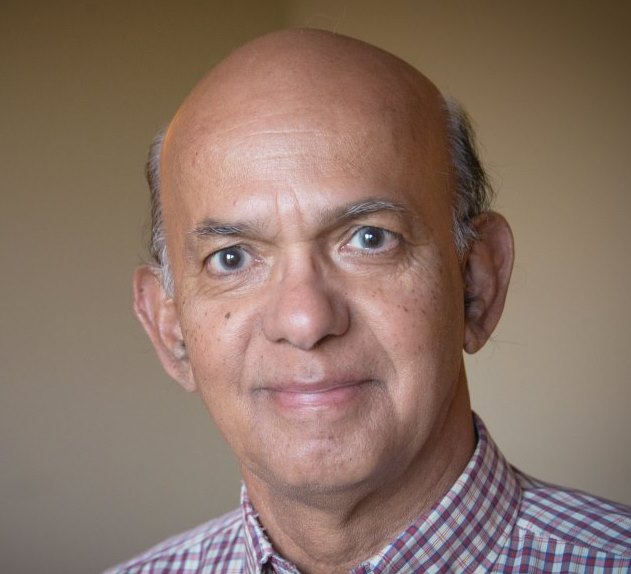 Mohan Bhagwandas Mohan Bhagwandas is Vice-President of IofC International. He has worked on conflict resolution in Northern Ireland, Quebec, South East Asia, Sri Lanka and Papua New Guinea. Entering the corporate world, Mohan was senior strategy consultant for the Kanbay Group of Companies, a global IT company. From 2006 to 2013, Mohan was the international coordinator for the "Trust & Integrity in the Global Economy" program in Europe.
 Ron Lawler Ron Lawler is the IC Treasurer. He retired from serving as the manager for planning and community services with the New South Wales State Government in Australia, based in the regional center of Wagga Wagga. Previously he worked for the national Aboriginal and Torres Strait Island Commission in support of the elected Aboriginal Council. He has spent time
working with the IofC team in Indonesia.
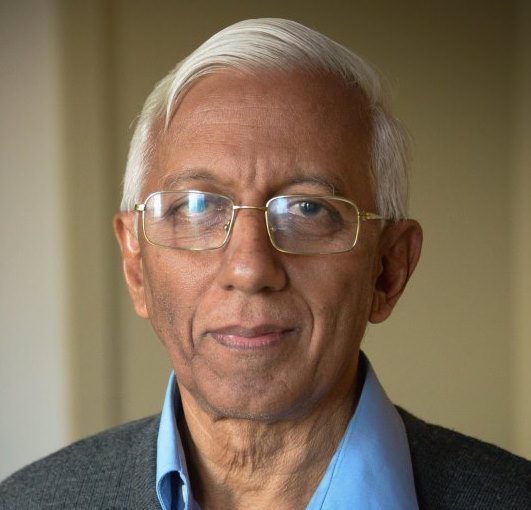 Kiran Gandhi, a member of the Board of Trustees of IofC India, has worked as the head of human resources at three global Indian companies and as the head of training at Tata Motors, Jamshedpur. He has been an independent human resource consultant and taught at several Indian business schools. Kiran is a regular facilitator at the IofC center in India and has designed and delivered training programs on ethical leadership. Kiran Gandhi, a member of the Board of Trustees of IofC India, has worked as the head of human resources at three global Indian companies and as the head of training at Tata Motors, Jamshedpur. He has been an independent human resource consultant and taught at several Indian business schools. Kiran is a regular facilitator at the IofC center in India and has designed and delivered training programs on ethical leadership.
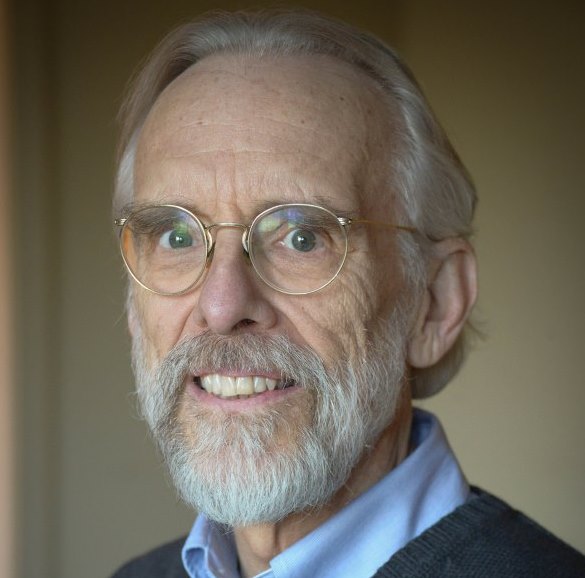 Barry Hart,PhD Barry Hart,PhD
is professor of Identity, Trauma and Conflict Studies in the Center for Justice and Peacebuilding at Eastern Mennonite University, VA. He has been a peacebuilding practitioner for 30 years in over 20 countries, He has also taught courses in restorative justice and human rights and dignity. In 1991 Barry helped plan the Caux Scholars program (CSP) and served as academic director from 1997 to 2010.
 Olena Kashkarova is Ukrainian with a Russian background. In 2001 she became involved in IofC's "Foundations for Freedom" program in Eastern Europe. Since then she has traveled in Europe, South-East Asia, Latin America and USA with IofC. She started the "'Healing the Past"' project in Ukraine to explore the different understandings of history that are the root cause of the present conflict. During the Maidan revolution in 2013-14 she initiated dialogues with all sides and worked for the UN Program for Development as a specialist on reconciliation. Olena Kashkarova is Ukrainian with a Russian background. In 2001 she became involved in IofC's "Foundations for Freedom" program in Eastern Europe. Since then she has traveled in Europe, South-East Asia, Latin America and USA with IofC. She started the "'Healing the Past"' project in Ukraine to explore the different understandings of history that are the root cause of the present conflict. During the Maidan revolution in 2013-14 she initiated dialogues with all sides and worked for the UN Program for Development as a specialist on reconciliation.
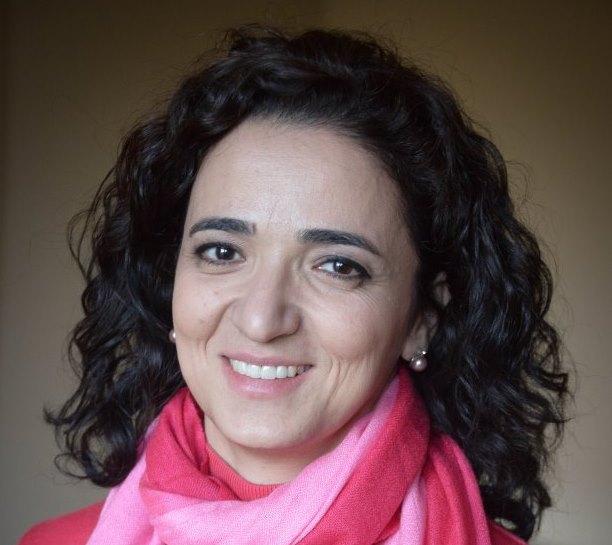 Wadiaa Khoury, a lecturer and researcher on educational policy in three universities in Lebanon, she has also engaged with the Ministry of Education and the Center of Educational Research and Development to establish a national Community Service program and in the civics curriculum development. Her doctoral studies focus on educational policy and the inclusion of the ethical and civic skills components in teacher training as a way to combat extremism. In 2001 she joined the IofC program "Action for Life" in India and East Asia and has continued her work with IofC in Africa and Europe. Wadiaa Khoury, a lecturer and researcher on educational policy in three universities in Lebanon, she has also engaged with the Ministry of Education and the Center of Educational Research and Development to establish a national Community Service program and in the civics curriculum development. Her doctoral studies focus on educational policy and the inclusion of the ethical and civic skills components in teacher training as a way to combat extremism. In 2001 she joined the IofC program "Action for Life" in India and East Asia and has continued her work with IofC in Africa and Europe.
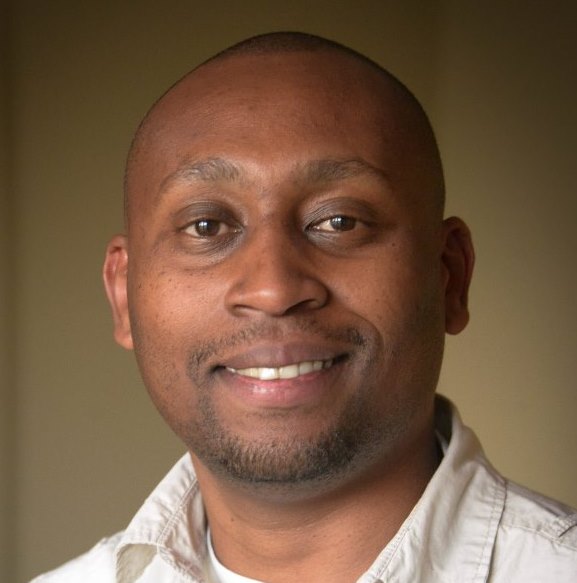 Stephen Kimaru serves as treasurer and secretary of the IofC board in Kenya and is also a member of the African Coordination Group. As an IofC volunteer for the last 9 years he has been involved in the Clean Elections Campaign, Eastern Africa Youth Program, Workshop for Africa and A Journey of Healing for national reconciliation in South Sudan. Currently he's heavily involved in the De-Radicalization program through interfaith dialogues and also in the Land, Lives and Peace initiative in Baringo County, Kenya. Stephen Kimaru serves as treasurer and secretary of the IofC board in Kenya and is also a member of the African Coordination Group. As an IofC volunteer for the last 9 years he has been involved in the Clean Elections Campaign, Eastern Africa Youth Program, Workshop for Africa and A Journey of Healing for national reconciliation in South Sudan. Currently he's heavily involved in the De-Radicalization program through interfaith dialogues and also in the Land, Lives and Peace initiative in Baringo County, Kenya.
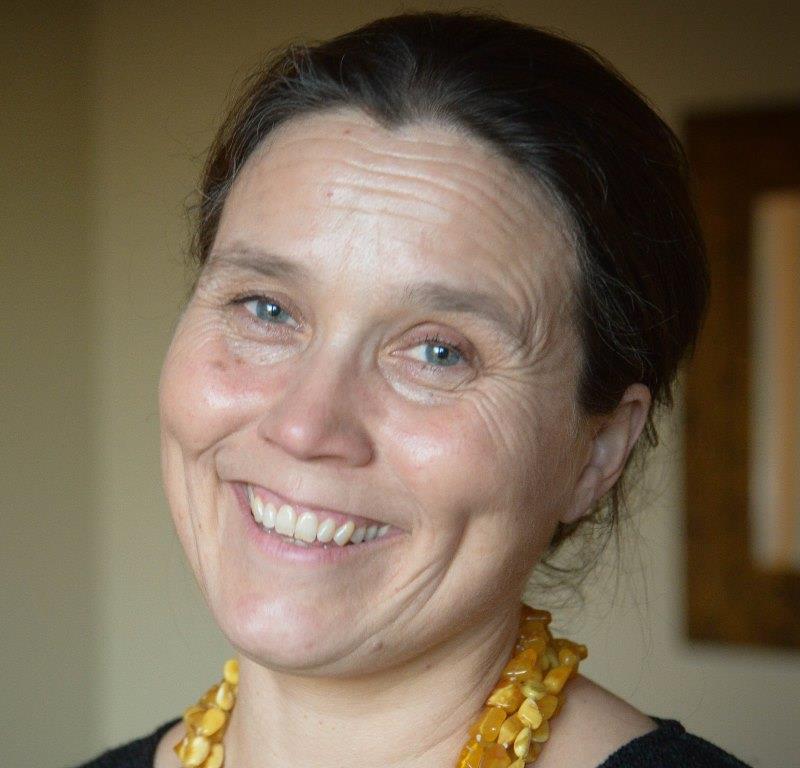 Camilla Wilhelmsen Nelson is a high school teacher in media and communication in Drammen, Norway. After receiving her MA in Visual Communication at the National Academy of Art and Design in Oslo, Norway, she worked freelance as a graphic designer and illustrator before starting her work as a teacher. For the last 8 years she has volunteered one day a week at the IofC center in Oslo. For the last 30 years she has been an organizer of the IofC New Year gatherings in Norway, and more recently the intergenerational conferences in Caux, Switzerland. Camilla Wilhelmsen Nelson is a high school teacher in media and communication in Drammen, Norway. After receiving her MA in Visual Communication at the National Academy of Art and Design in Oslo, Norway, she worked freelance as a graphic designer and illustrator before starting her work as a teacher. For the last 8 years she has volunteered one day a week at the IofC center in Oslo. For the last 30 years she has been an organizer of the IofC New Year gatherings in Norway, and more recently the intergenerational conferences in Caux, Switzerland.
 Camilo Villa, from Colombia, creates learning experiences combining knowledge, methods and tools from social sciences to entrepreneurship, internet tools and Native American wisdom. His journey has been complex with great success but also years of great loss. His return to Colombia after time abroad was more than relocation, it was an important grounding experience. His level of engagement with the Colombian IofC team has been increasing. With his wife he promotes reconciliation and forgiveness circles. Camilo Villa, from Colombia, creates learning experiences combining knowledge, methods and tools from social sciences to entrepreneurship, internet tools and Native American wisdom. His journey has been complex with great success but also years of great loss. His return to Colombia after time abroad was more than relocation, it was an important grounding experience. His level of engagement with the Colombian IofC team has been increasing. With his wife he promotes reconciliation and forgiveness circles.
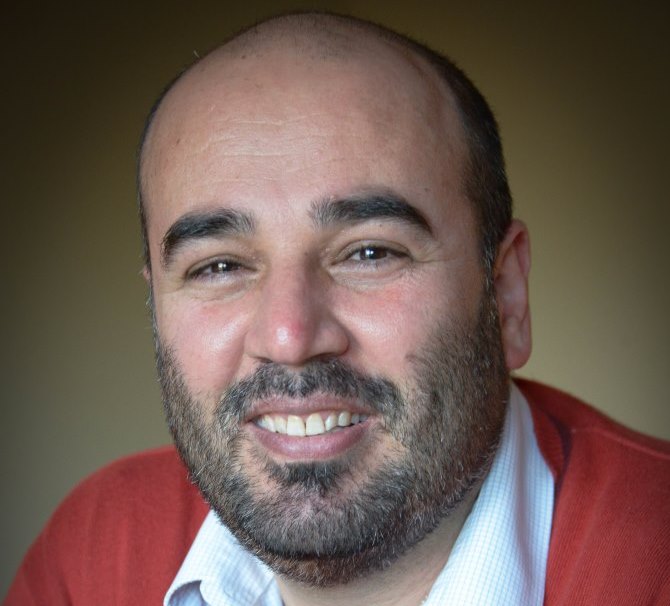 Imad Karam
is the Executive Director and head of the management team. His responsibilities include leading the executive activities of IofC International as well as
the development and implementation of the IofC Framework for Common Action, IofC International Strategic Plan and annual operational plans. Imad Karam
is the Executive Director and head of the management team. His responsibilities include leading the executive activities of IofC International as well as
the development and implementation of the IofC Framework for Common Action, IofC International Strategic Plan and annual operational plans.
Imad is Palestinian now living in the UK with his wife and son.
|
Plan on visiting Caux this summer!
June 30, 2017
Official Opening
June 29-July 2, 2017
Ethical Leadership in Business
July 4-9, 2017
Just Governance for Human Security
July 11-15, 2017
Caux Dialogue on Land and Security
July 17-21, 2017
Addressing Europe's Unfinished Business
July 23-26, 2017
Towards an inclusive peace
July 29-August 4, 2017
Children as Actors for Transforming Society
|
|
The 2016 Caux Report is now published online. Hard copies will be available from our office.
|
|
Trustbuilding
now in paperback
|
by Rob Corcoran
Read Rob Corcoran's latest blog
|
Initiatives of Change, USA
is part of a diverse global network with an 80-year track record of peacebuilding, conflict transformation and forging partnerships across divides of race, class, religion and politics.
Our vision
We inspire a vision of community where a commitment to reconciliation and justice transcends competing identities and interests.
Our mission
We equip leaders to build trust in diverse communities through a process of personal change, inclusive dialogue, healing historical conflict and teambuilding
Our focus
We connect core values with personal and public action with a focus on racial reconciliation, economic inclusion and interfaith understanding.
For more information
|
|
|